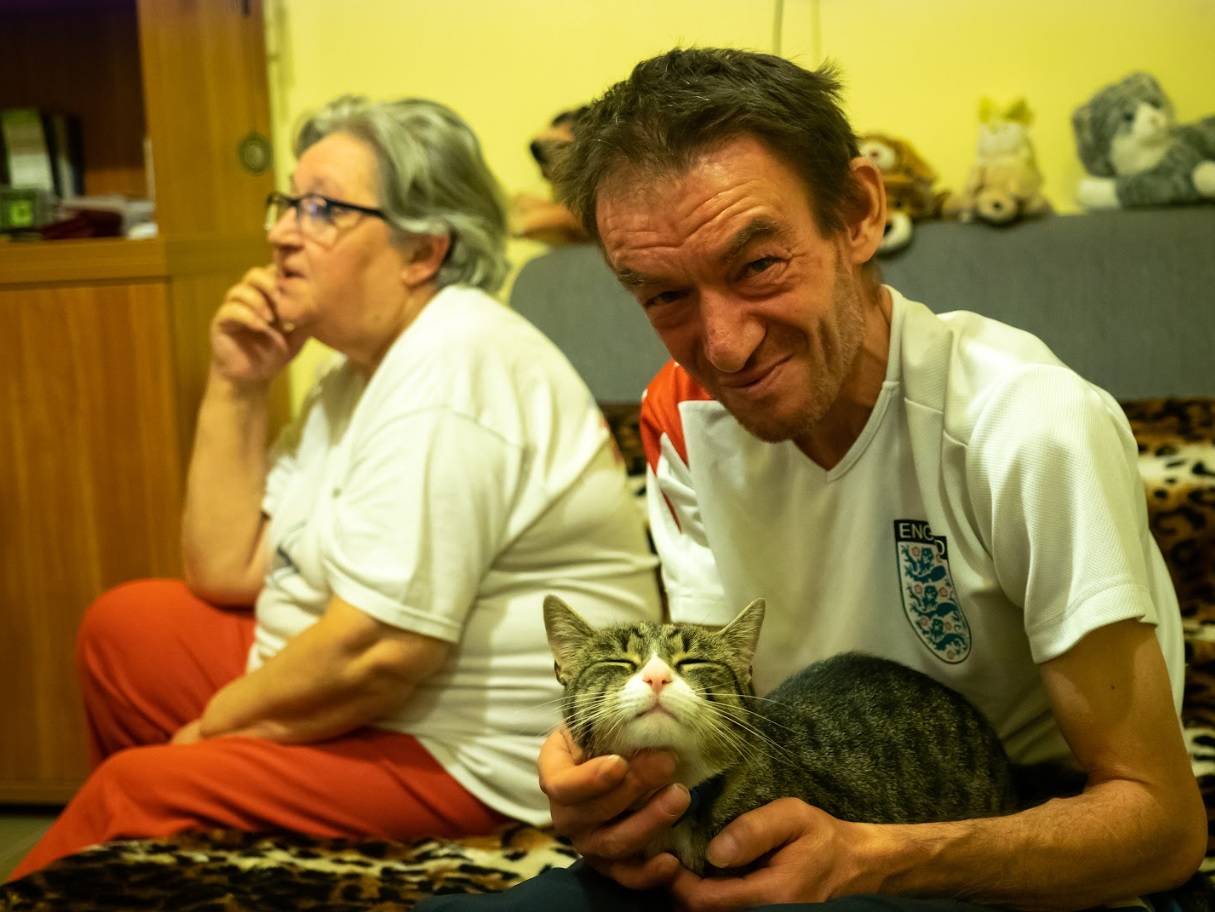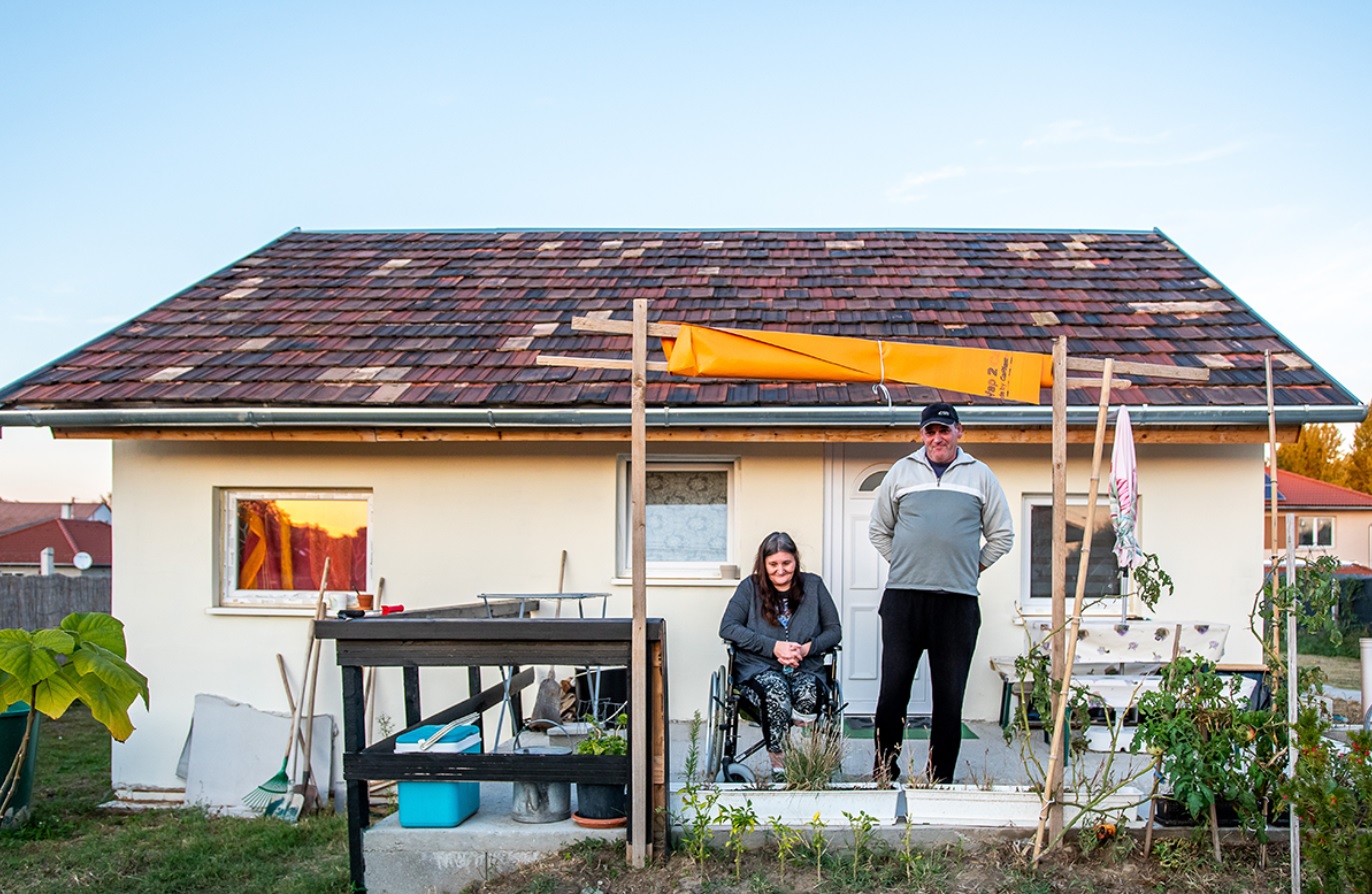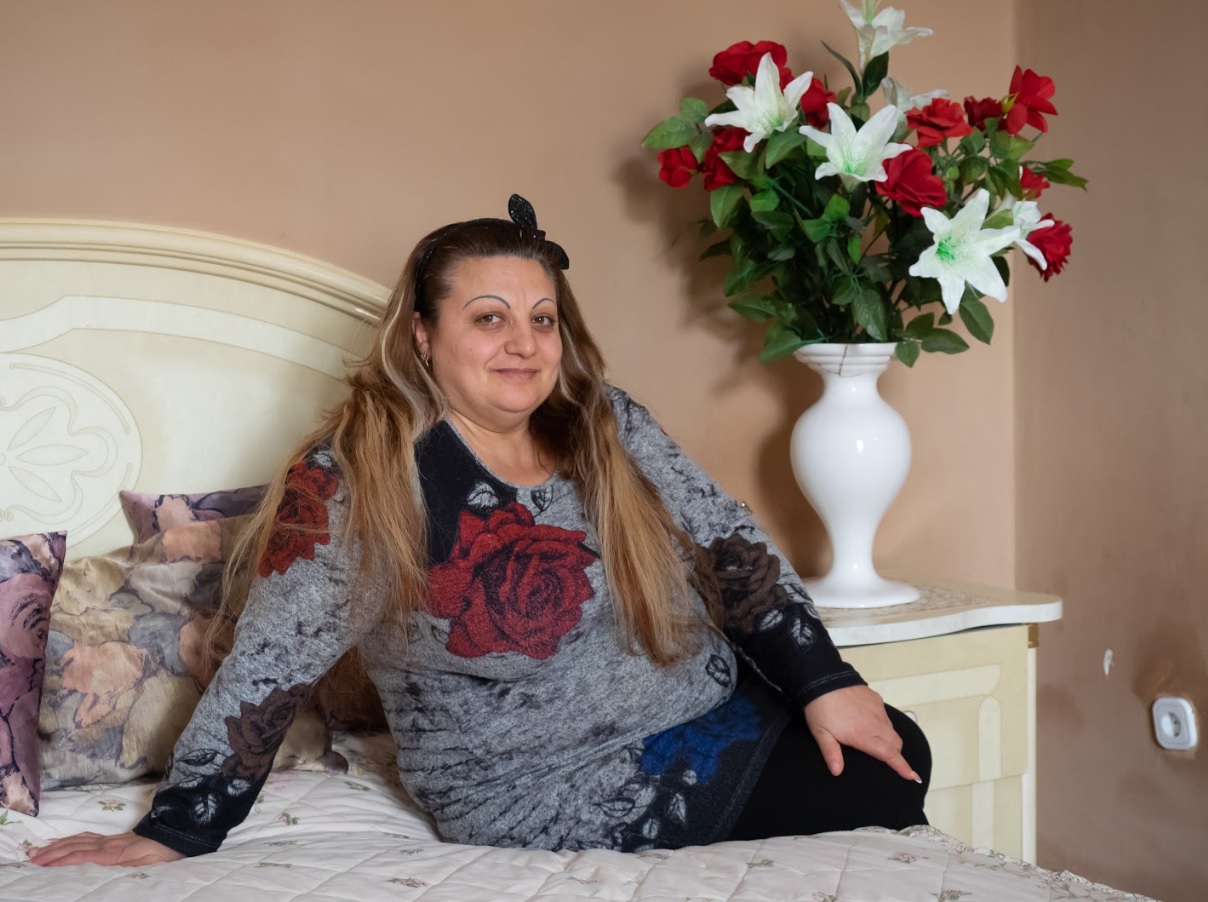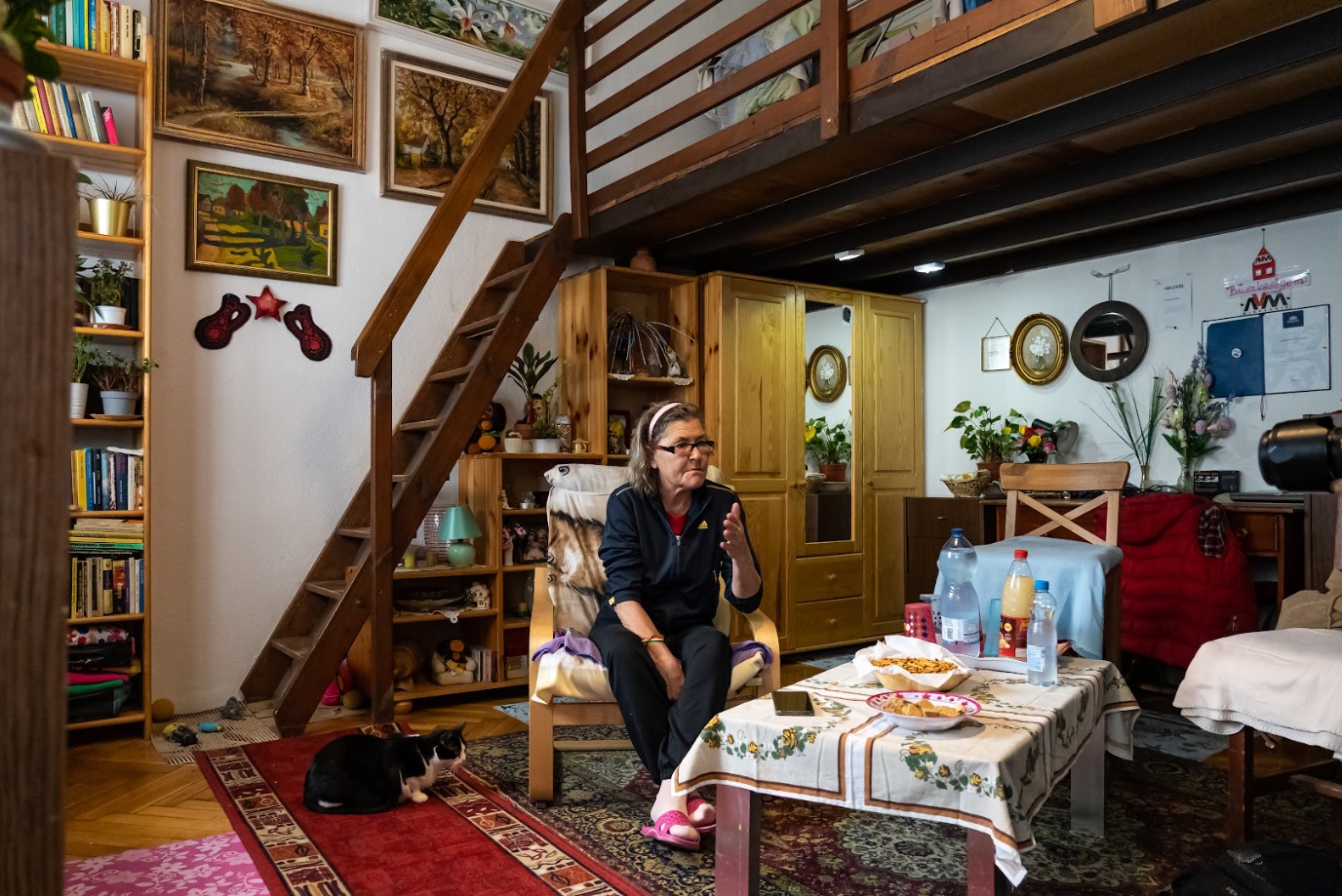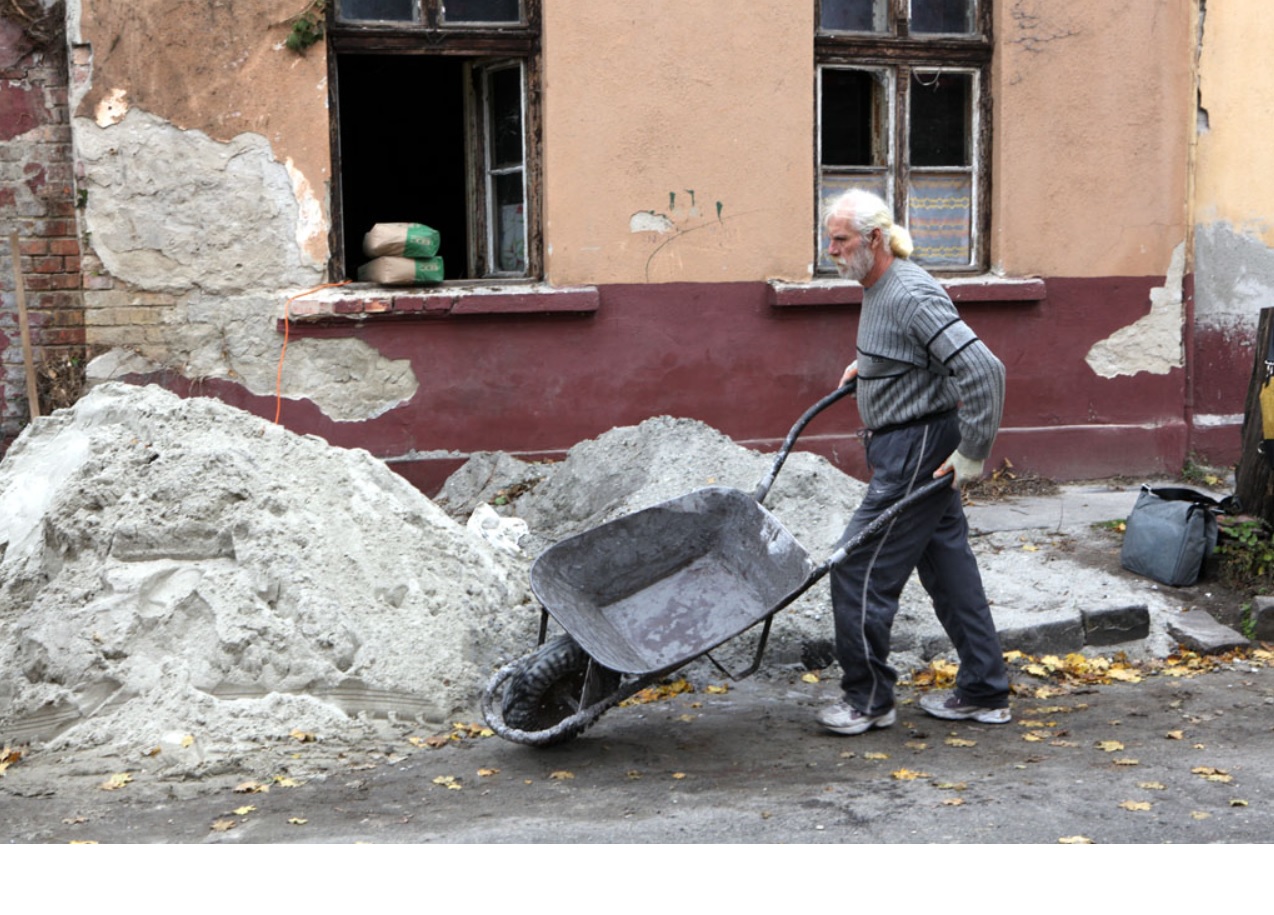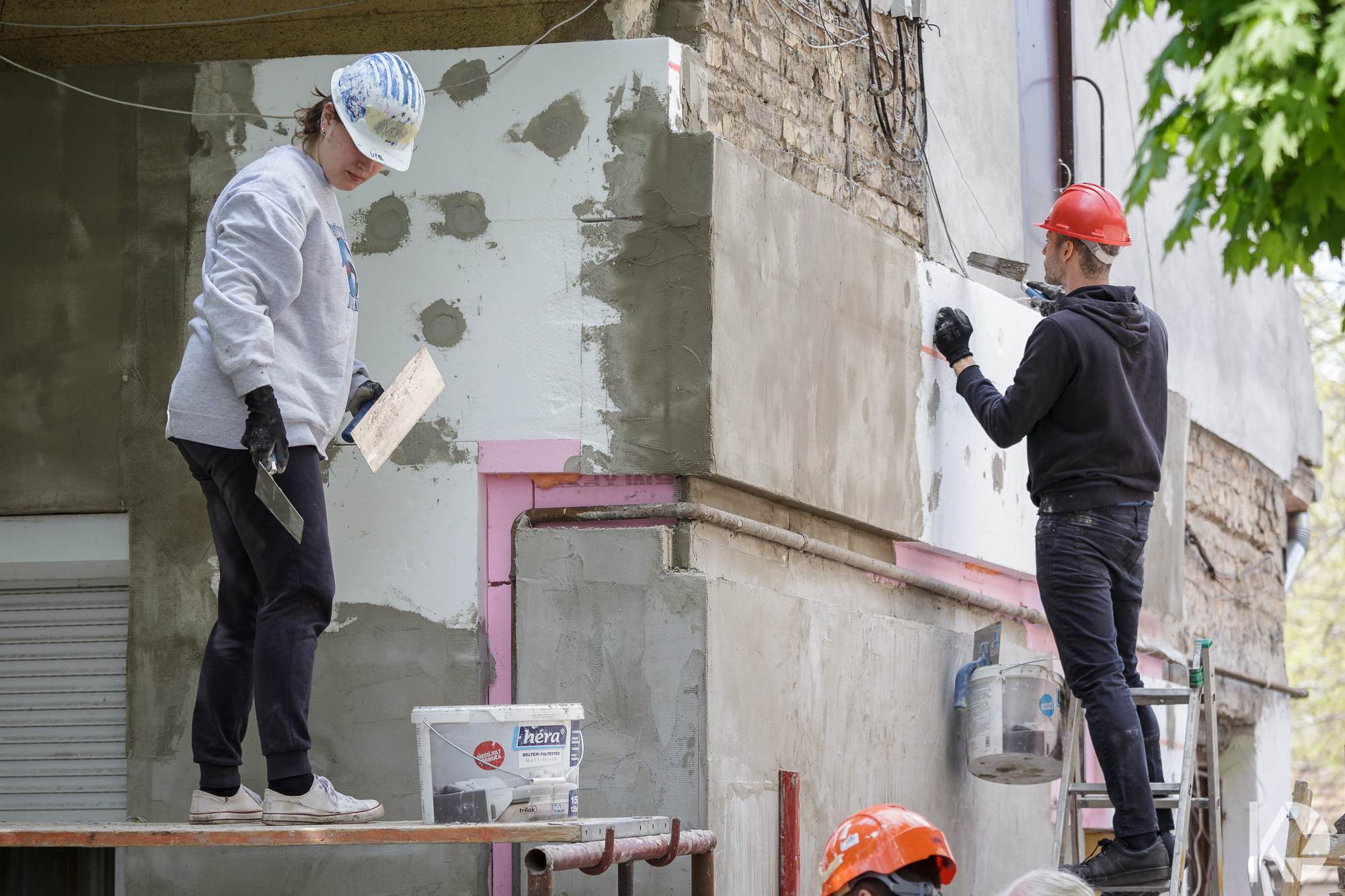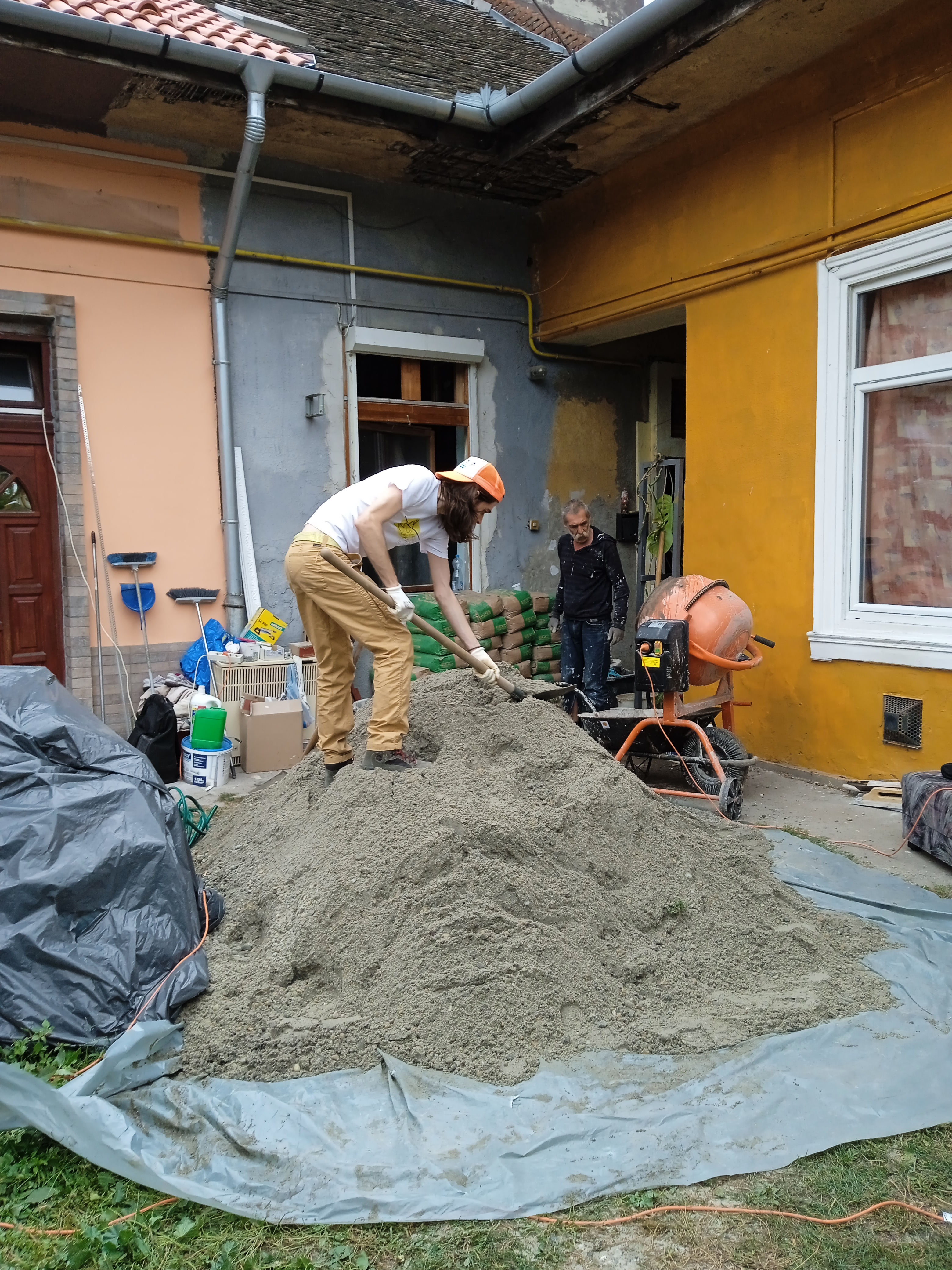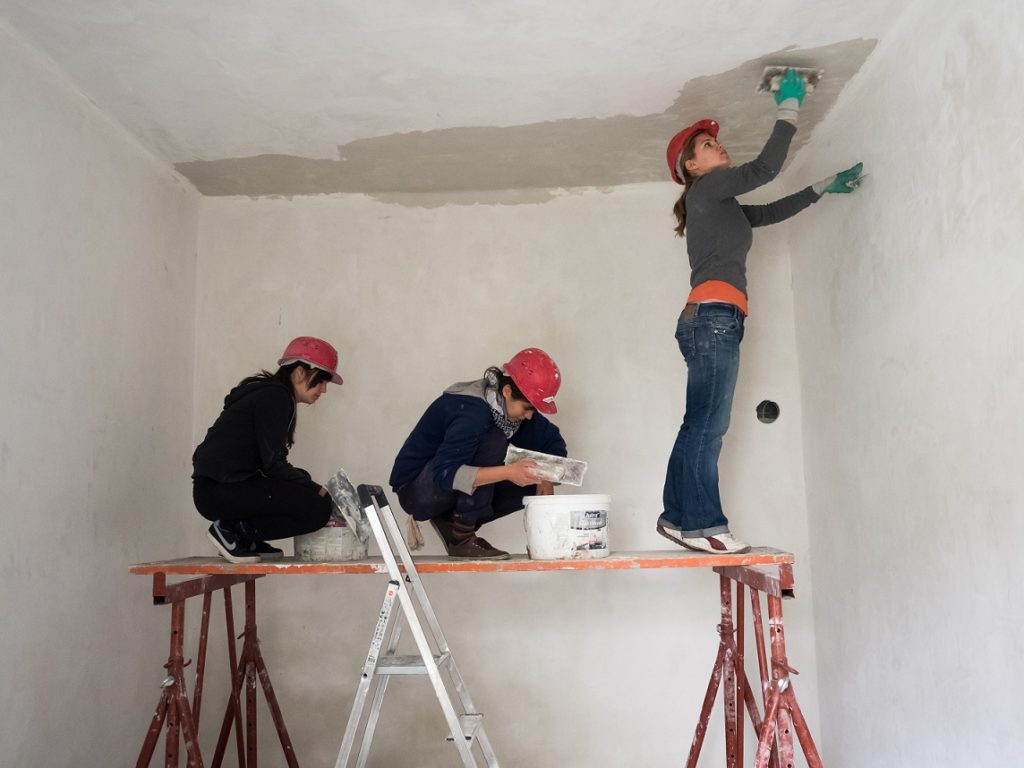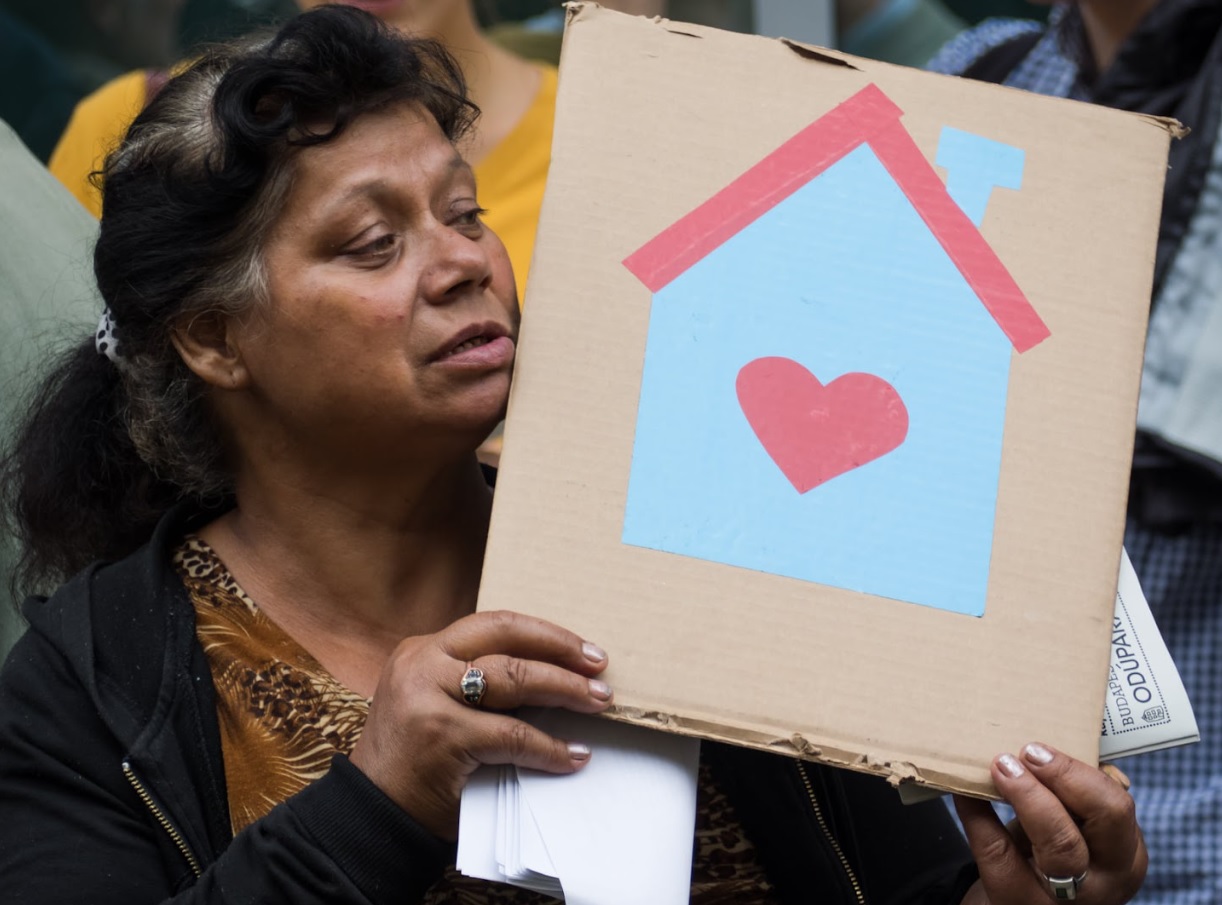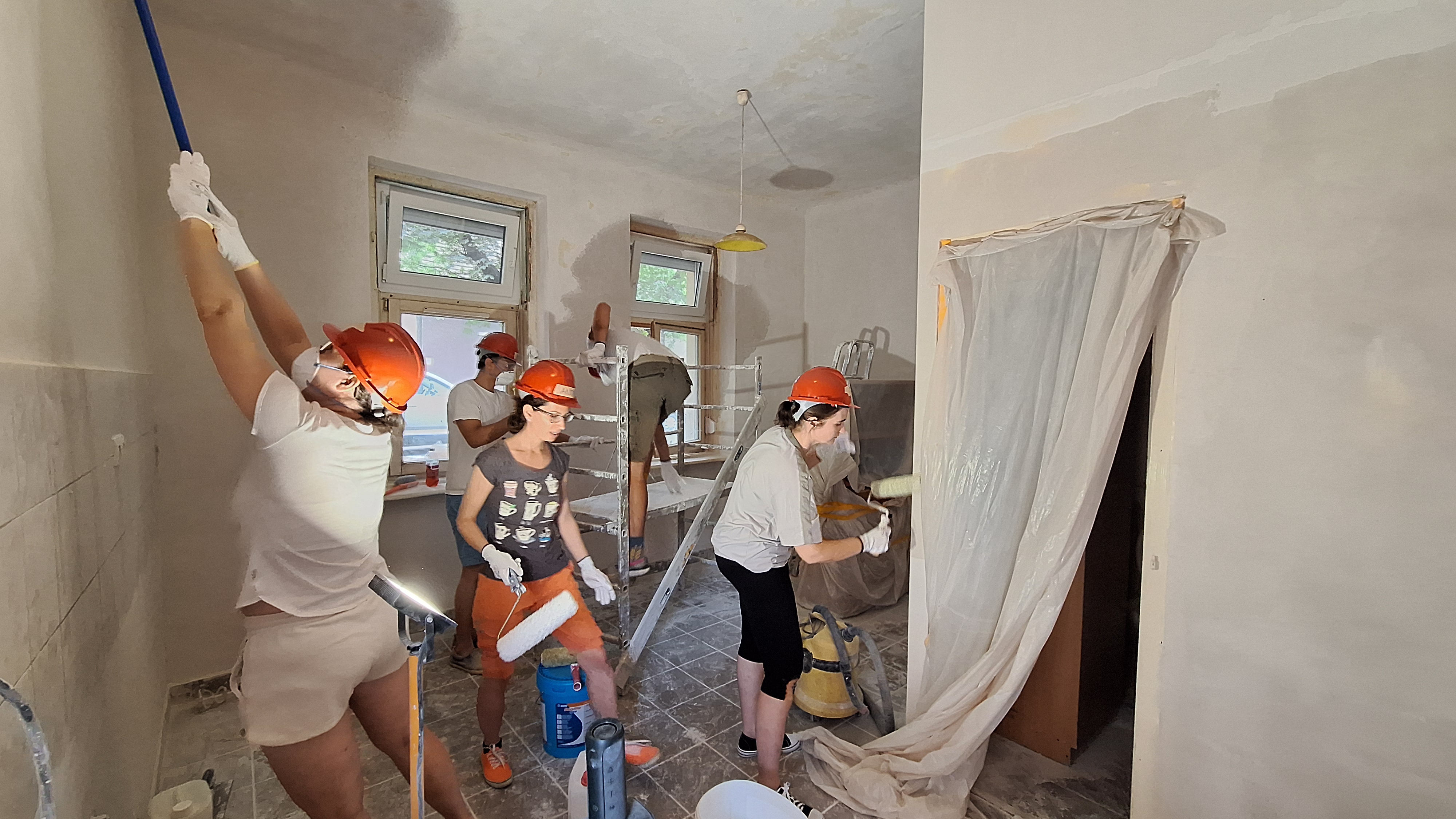Prioritising the places and people that need it the most
From Huts to Homes!
Creating sustainable social housing for homeless people from unused municipal dwellings
The From Huts to Homes programme helps homeless people and families move from self-built huts to sustainable, affordable rentals, renovated with the help of volunteers and future tenants. This allows them to reintegrate into the fabric of urban society through the crucial first step of establishing a permanent personal space that they can call their homes. To create sustainable societies, social work and community programmes support our tenants.
Hungary
Local
10th District of Budapest
Mainly urban
It refers to a physical transformation of the built environment (hard investment)
Yes
2024-12-01
No
No
Yes
Yes
Yes
As a representative of an organisation
Hungary is in a housing crisis as rents have almost doubled in the last decade. Our goal at From Streets to Homes Association (FSHA) is to enable people living in homelessness or housing property to have a dignified, personal space that they can call home, the foundation of our place in the urban, spatially organised social fabric. We thus consider housing security the first step in social reintegration: our purpose is to help clients retain their housing in the long run, for which we identify employment opportunities, and/or social transfers when appropriate.
In our programme, ‘From Huts to Homes!’, we cooperate with municipalities to repurpose unused municipal housing units that can be rented out to homeless people (in Budapest, there are 4500 such flats). Future tenants and volunteers help with renovations that turn these often derelict spaces into sustainable, energy efficient and low-cost flats.
People exiting homelessness are often isolated, carry trauma and lack personal support networks, especially our typically elderly tenants. Therefore, before and after moving in, we provide intensive, partnership-based social work focusing on empowerment by gaining autonomy and self-determination in their new living spaces and in the community surrounding them. To support their integration into their lived environments, we organise move-in groups for new tenants. We organise regular community events to forge our tenants into a cohesive community. We organise peer support to channel in our tenants’ expertise of experience into the support process. We organise support groups for labour market integration. Finally, we organise support groups for women to allow them to heal from traumatic experiences.
A key to our work is its focus on advocacy and human rights. We empower tenants by helping them access healthcare, education, and welfare. Supporting tenants in becoming their own advocates we help break down barriers and challenge discrimination against marginalized groups.
In our programme, ‘From Huts to Homes!’, we cooperate with municipalities to repurpose unused municipal housing units that can be rented out to homeless people (in Budapest, there are 4500 such flats). Future tenants and volunteers help with renovations that turn these often derelict spaces into sustainable, energy efficient and low-cost flats.
People exiting homelessness are often isolated, carry trauma and lack personal support networks, especially our typically elderly tenants. Therefore, before and after moving in, we provide intensive, partnership-based social work focusing on empowerment by gaining autonomy and self-determination in their new living spaces and in the community surrounding them. To support their integration into their lived environments, we organise move-in groups for new tenants. We organise regular community events to forge our tenants into a cohesive community. We organise peer support to channel in our tenants’ expertise of experience into the support process. We organise support groups for labour market integration. Finally, we organise support groups for women to allow them to heal from traumatic experiences.
A key to our work is its focus on advocacy and human rights. We empower tenants by helping them access healthcare, education, and welfare. Supporting tenants in becoming their own advocates we help break down barriers and challenge discrimination against marginalized groups.
housing
homelessness
social
inclusive
sustainable
Sustainability is at the heart of From Huts to Homes! We are repurposing existing housing stock when renovating unused municipal flats, thus avoiding new constructions and the accompanying significant CO2 emissions and waste. (The construction sector is responsible for over 35% of the EU's total waste generation.) In the last couple of years, we have increased our focus on the sustainability of our renovations (instead of focusing on lowering our costs and thus making more renovations from a small amount of money), while ensuring that our energy interventions are cost effective is still key to our operations. Our ambition is to continually introduce new energy efficiency measures and sustainable building materials (e.g., natural or circular materials). We also repurpose second-hand furniture in our work.
We are closing the loop around our work by constantly reviewing the carbon and environmental impact in light of our commitment to lower our impact. We improve heating systems and install insulation even in flats already in our programme if feasible, while also pioneering innovative technologies like breathable walls.
Finally, we are committed to environmental regeneration through social transformation. While our ability to restore or converse biodiversity is limited (our flats are located in apartment blocks in urban settings), we are dedicated to the vision of a sustainable society. In this light, we educate our tenants on how to use and maintain their new homes in order to reduce their carbon emissions and waste, thus fostering behavioural change towards sustainability.
Our efforts at sustainability thus make the most out of limiting circumstances (e.g., we are working with individual flats and not with whole buildings, that limit our possibilities, so we are not able to put up solar panels). We are committed to do so for environmental reasons, but also in order to reduce utility costs for our tenants and thus further lowering their housing costs.
We are closing the loop around our work by constantly reviewing the carbon and environmental impact in light of our commitment to lower our impact. We improve heating systems and install insulation even in flats already in our programme if feasible, while also pioneering innovative technologies like breathable walls.
Finally, we are committed to environmental regeneration through social transformation. While our ability to restore or converse biodiversity is limited (our flats are located in apartment blocks in urban settings), we are dedicated to the vision of a sustainable society. In this light, we educate our tenants on how to use and maintain their new homes in order to reduce their carbon emissions and waste, thus fostering behavioural change towards sustainability.
Our efforts at sustainability thus make the most out of limiting circumstances (e.g., we are working with individual flats and not with whole buildings, that limit our possibilities, so we are not able to put up solar panels). We are committed to do so for environmental reasons, but also in order to reduce utility costs for our tenants and thus further lowering their housing costs.
We believe that a genuinely beautiful abode is one where the tenant feels at home. We are activating their lives by improving their comfort. Moving from huts to homes is the greatest improvement of our tenants’ comfort, but – linking back to our sustainability efforts – deploying modern, efficient heating or ventilation systems is key to improving comfort further. Tenants’ sensory and aesthetic senses are also opened up in the project as they have control over their homes’ aesthetics: they can repaint and redecorate and they can choose furniture: this makes it their home and it is only as beautiful as it is theirs.
On the other hand, our renovations take place in the context of a local architectural tradition. These flats are typical examples of late 19th century working-class Budapest homes. We show models by renovating such flats in a cost-effective and yet environmentally sustainable way, while respecting all regulations regarding the character of the area and architectural heritage.
We connect people in the virtual space of our community, rethinking social services in a communal way. Tenants come together at our events, creating a beautiful community where they can thrive. Peer support and support groups further strengthen a sense of community while they learn from us and each other. The general public can also connect to our work through awareness raising and volunteering helping our renovations, building spaces together to fight homelessness.
Integration is our works' key goal. Having their own, personal space is a prerequisite to rethink and control their way of life. We support our tenants further in this process through social work and community building. Positive, significantly life-enhancing change takes place first rapidly when tenants are moving into their new homes, and then gradually through our social support. We are committed to supporting our tenants with flats and social work as long as it is necessary, potentially until the end of their lives.
On the other hand, our renovations take place in the context of a local architectural tradition. These flats are typical examples of late 19th century working-class Budapest homes. We show models by renovating such flats in a cost-effective and yet environmentally sustainable way, while respecting all regulations regarding the character of the area and architectural heritage.
We connect people in the virtual space of our community, rethinking social services in a communal way. Tenants come together at our events, creating a beautiful community where they can thrive. Peer support and support groups further strengthen a sense of community while they learn from us and each other. The general public can also connect to our work through awareness raising and volunteering helping our renovations, building spaces together to fight homelessness.
Integration is our works' key goal. Having their own, personal space is a prerequisite to rethink and control their way of life. We support our tenants further in this process through social work and community building. Positive, significantly life-enhancing change takes place first rapidly when tenants are moving into their new homes, and then gradually through our social support. We are committed to supporting our tenants with flats and social work as long as it is necessary, potentially until the end of their lives.
We are working for a socially just and inclusive future where everyone has a place to call their home. We consider homelessness one of the gravest forms of social exclusion (as a home is preliminary to so many areas of thriving), and we are breaking harmful social models by our struggle for universal housing, while also setting an example for state actors. By our communal working principles and community building, we also pioneer new ways of living together.
Our project is ensuring equal access for all. Our tenants are often intersectionally disadvantaged, as homelessness is linked to discrimination (e.g., against Roma people) or disadvantaged personal histories (e.g., growing up in residential childcare, where in turn Roma children are overrepresented). Such intersecting inequalities are consciously incorporated into our work as we try to represent the need of less represented communities (homeless people, but also women, Roman people, disabled people, the elderly, and LGBTQ+ people) in our works. In order to do so and compensate for these disadvantages, we have continuously upgraded and fine-tuned our working practices.
We empower our tenants and thus underrepresented people in order to thrive in society, thus ensuring that they can access equal opportunities and resources. This means enabling our formerly homeless tenants to reintegrate into society, with special attention paid to the specific struggles of women, LGBTQ+ people, and ethnic minorities.
Affordability is a key principle of our work: we have to ensure that money is no barrier to housing. Many of our tenants, especially elderly tenants who can no longer work but have no pensions, continue to live on low incomes. Our housing units are low-cost (with rents around €50-100) and we provide further support (e.g., in-kind assistance, Give Work! groups for seeking employment, etc.).
Our project is ensuring equal access for all. Our tenants are often intersectionally disadvantaged, as homelessness is linked to discrimination (e.g., against Roma people) or disadvantaged personal histories (e.g., growing up in residential childcare, where in turn Roma children are overrepresented). Such intersecting inequalities are consciously incorporated into our work as we try to represent the need of less represented communities (homeless people, but also women, Roman people, disabled people, the elderly, and LGBTQ+ people) in our works. In order to do so and compensate for these disadvantages, we have continuously upgraded and fine-tuned our working practices.
We empower our tenants and thus underrepresented people in order to thrive in society, thus ensuring that they can access equal opportunities and resources. This means enabling our formerly homeless tenants to reintegrate into society, with special attention paid to the specific struggles of women, LGBTQ+ people, and ethnic minorities.
Affordability is a key principle of our work: we have to ensure that money is no barrier to housing. Many of our tenants, especially elderly tenants who can no longer work but have no pensions, continue to live on low incomes. Our housing units are low-cost (with rents around €50-100) and we provide further support (e.g., in-kind assistance, Give Work! groups for seeking employment, etc.).
Autonomy, self-governance and the belief that everyone has the capacity to represent their own interests is at the heart of our operations, radiating from all our decision-making structures. Being rooted in housing activism, empowerment of (formerly) homeless people and allowing them to speak for themselves is still in our DNA. Homeless people who were involved in the housing movement were involved in the development of the programme from its inception.
We therefore understand ourselves in an egalitarian and communal spirit, where tenants are on an equal footing to our organisation. This is reflected in initiatives such as peer support, where tenants are recognised as experts of experience and get involved more closely in our work. They mentor other tenants who are less progressed in their social reintegration based on their own personal experiences, creating non-paternalistic and empathic support mechanisms. Egalitarianism and community also characterises our ‘Move In’ groups where we prepare our tenants for communal living in a non-paternalistic manner that builds upon our older tenants’ experiences.
We are consulting with our tenants regularly in social work sessions. These provide informal occasions for their feedback and needs to be registered that can then feed into our service development processes. We have more formalised structures to include our tenants into our programme, e.g., through peer support and the weekly meeting of peer mentors. These channels are used to co-develop our programmatic improvements.
We are also aware that, due to limited resources, our programme is closed for many people. This is why we lobby for changes in policy, and why we expand our programme portfolio and involve new flats to our programmes.
We therefore understand ourselves in an egalitarian and communal spirit, where tenants are on an equal footing to our organisation. This is reflected in initiatives such as peer support, where tenants are recognised as experts of experience and get involved more closely in our work. They mentor other tenants who are less progressed in their social reintegration based on their own personal experiences, creating non-paternalistic and empathic support mechanisms. Egalitarianism and community also characterises our ‘Move In’ groups where we prepare our tenants for communal living in a non-paternalistic manner that builds upon our older tenants’ experiences.
We are consulting with our tenants regularly in social work sessions. These provide informal occasions for their feedback and needs to be registered that can then feed into our service development processes. We have more formalised structures to include our tenants into our programme, e.g., through peer support and the weekly meeting of peer mentors. These channels are used to co-develop our programmatic improvements.
We are also aware that, due to limited resources, our programme is closed for many people. This is why we lobby for changes in policy, and why we expand our programme portfolio and involve new flats to our programmes.
Our project is deeply embedded in the local context of the 10th District of Budapest, Kőbánya and our future tenants live in the Terebesi Forest in the district, in a place-based approach that ensures that homeless people continue to live in the same area. We thus influence and improve the local environment through showing examples, reducing street homelessness and by renovating flats. Our work is based on a decade-long partnership with the Municipality of Kőbánya who support us with empty flats that we can renovate and rent to our future tenants. We work closely with local social service providers (e.g., child protection services and street social workers) both in recruiting and later supporting our clients, and we also work closely with the municipality. Local civil society actors are also part of our network of supporters, e.g., we organise our Christmas dinners at the local Lutheran church’s community hall.
Our project interacts with other organisations and networks beyond its local context. From Huts to Homes! is, first, linked up with our organisation’s other housing programmes that cover the whole Budapest area. Second, we cooperate with other housing organisations, as well as other NGOs and think tanks, to promote changes to housing policies of the national and local governments, cooperating in initiatives such as the ‘Housing Minimum’ policy package that electoral candidates can endorse. Based on our good practices from this and other programmes, we are actively involved in influencing the national discourse on housing and homelessness, promoting Housing First as the most effective method to counter homelessness.
We also see ourselves as parts of a global movement for affordable, universal housing. On the global scene, we are part of multiple international and European networks. We are a Member of FEANTSA and work together with World Habitat. Additionally, we work with housing organisations from the Central European region on projects.
Our project interacts with other organisations and networks beyond its local context. From Huts to Homes! is, first, linked up with our organisation’s other housing programmes that cover the whole Budapest area. Second, we cooperate with other housing organisations, as well as other NGOs and think tanks, to promote changes to housing policies of the national and local governments, cooperating in initiatives such as the ‘Housing Minimum’ policy package that electoral candidates can endorse. Based on our good practices from this and other programmes, we are actively involved in influencing the national discourse on housing and homelessness, promoting Housing First as the most effective method to counter homelessness.
We also see ourselves as parts of a global movement for affordable, universal housing. On the global scene, we are part of multiple international and European networks. We are a Member of FEANTSA and work together with World Habitat. Additionally, we work with housing organisations from the Central European region on projects.
Our project is based around two separate forms of expertise. First, we require technical knowledge about renovations and energy efficient, low-emission construction to carry out our renovation works. Second, we rely on social scientific knowledge about social work, social integration and community building. This means that our staff and partners represent a wide range of educational backgrounds, in terms of discipline but also in terms of educational attainment. These fields of knowledge coalesce around a shared goal of making housing a human right, with our knowledge production also concentrating on making our goal into a reality.
This multidisciplinary approach is transformed into an interdisciplinary one when the knowledge of each field is integrated into our results. For example, energy renovation efforts also serve important social goals (reduction in costs of living and creating comfortable homes) while social work methodology is key to achieve our energy saving goals in households. This leads to knowledge generation that we utilise in our awareness raising work as the leading Hungarian experts of the Housing First approach.
Finally, we also move beyond disciplinary boundaries. We recognise and incorporate the informal knowledge of our tenants, as they participate in our work as experts of experience (e.g., in peer support). This culminated in the creation of procedures where tenants can become full members of staff.
This multidisciplinary approach is transformed into an interdisciplinary one when the knowledge of each field is integrated into our results. For example, energy renovation efforts also serve important social goals (reduction in costs of living and creating comfortable homes) while social work methodology is key to achieve our energy saving goals in households. This leads to knowledge generation that we utilise in our awareness raising work as the leading Hungarian experts of the Housing First approach.
Finally, we also move beyond disciplinary boundaries. We recognise and incorporate the informal knowledge of our tenants, as they participate in our work as experts of experience (e.g., in peer support). This culminated in the creation of procedures where tenants can become full members of staff.
While it is recognised as the most effective method to end homelessness in the US and Western Europe, Housing First (HF) is still in its early phases in Central and Eastern Europe. For example, the main HF initiative in Austria only launched in 2021 and was still in its pilot stage last year. Eastern European countries, HF is even less developed.
We launched our HF initiative in 2013 which serves as a model for other Hungarian housing providers. One of the key concerns in designing our programme was to adapt HF to our local context, with significant limitations. In Budapest, only 4% of people live in social housing, the publicly owned housing sector is limited. Meanwhile, thousands of municipal flats in Budapest are empty (372 in Kőbánya where our project is located) and usually require significant renovations to become habitable. Our project was initiated in a political context where street homelessness was criminalised but routes out from homelessness were not opened up.
Our project is innovative because we had to work within these limitations. For example, compared to Western examples, our programme is rooted in housing activism and not in central social services. This brought with it volunteering, inclusion, and empowerment as key elements of our work, moving beyond the top-down nature of state HF initiatives. Sustainability, too, is the positive outcome of our limited means: we needed to focus on unused flats that could be utilised easily, and thus reduced our carbon footprint.
Community is also an innovative aspect of our programme, compared to other HF initiatives. This goes hand in hand with the inclusion of our tenants as experts of experience in our work.
We launched our HF initiative in 2013 which serves as a model for other Hungarian housing providers. One of the key concerns in designing our programme was to adapt HF to our local context, with significant limitations. In Budapest, only 4% of people live in social housing, the publicly owned housing sector is limited. Meanwhile, thousands of municipal flats in Budapest are empty (372 in Kőbánya where our project is located) and usually require significant renovations to become habitable. Our project was initiated in a political context where street homelessness was criminalised but routes out from homelessness were not opened up.
Our project is innovative because we had to work within these limitations. For example, compared to Western examples, our programme is rooted in housing activism and not in central social services. This brought with it volunteering, inclusion, and empowerment as key elements of our work, moving beyond the top-down nature of state HF initiatives. Sustainability, too, is the positive outcome of our limited means: we needed to focus on unused flats that could be utilised easily, and thus reduced our carbon footprint.
Community is also an innovative aspect of our programme, compared to other HF initiatives. This goes hand in hand with the inclusion of our tenants as experts of experience in our work.
We renovate vacant, deteriorated municipal apartments with the support of volunteers and the involvement of homeless families who will ultimately move into these homes.The importance of the involvement of prospective tenants is that they themselves can often gain lasting acquaintances, work experience or job opportunities through the construction projects. This inclusive approach helps to break the cycle of homelessness by creating a sense of ownership and belonging for the families involved in their urban environments. In order to maintain the services co-operation with local authorities play an important role.
At the heart of FSHA’s work is a holistic approach that addresses not only the immediate need for housing but also the broader social, economical and systemic barriers that contribute to homelessness. Our work doesn’t end with the move in day, we continue to provide intensive social work services understanding the needs of our tenants. We form our services based on their feedback. We also facilitate peer support groups, creating safe spaces where participants can share experiences and strategies for overcoming challenges. The Move-In Support Group helps individuals navigate the complex transition to stable housing, offering practical advice and emotional support during this pivotal time. Additionally, FSHA’s Women’s Group and Women’s Club fosters empowerment and resilience among women, addressing their unique needs and building a supportive community. Finally, Give Work! supports our clients with job seeking.
These groups create a community and supportive relationship between people who have lived experience in common to solve their everyday challenges. Sharing experiences and knowledge in a group of people with similar experiences empower people to participate in decisions and actions that affect their lives.
At the heart of FSHA’s work is a holistic approach that addresses not only the immediate need for housing but also the broader social, economical and systemic barriers that contribute to homelessness. Our work doesn’t end with the move in day, we continue to provide intensive social work services understanding the needs of our tenants. We form our services based on their feedback. We also facilitate peer support groups, creating safe spaces where participants can share experiences and strategies for overcoming challenges. The Move-In Support Group helps individuals navigate the complex transition to stable housing, offering practical advice and emotional support during this pivotal time. Additionally, FSHA’s Women’s Group and Women’s Club fosters empowerment and resilience among women, addressing their unique needs and building a supportive community. Finally, Give Work! supports our clients with job seeking.
These groups create a community and supportive relationship between people who have lived experience in common to solve their everyday challenges. Sharing experiences and knowledge in a group of people with similar experiences empower people to participate in decisions and actions that affect their lives.
Transferability is key to our work and is done on multiple levels. First, the raison d’etre of our work is to present models for the Hungarian state and other housing providers in order to demonstrate how Housing First methods can be used in the Hungarian context to end homelessness. For example, our work feeds into our work on housing policy, such as our policy proposals presented to electoral candidates. This can then be also disseminated to other Central and Eastern European housing initiatives, and for this reason, we are building our international network of housing experts and organisations.
Second, we also disseminate this knowledge into our other housing programmes. By now, we have three programmes beyond From Huts to Homes that are in large part based on the results of From Huts to Homes, but transferred our expertise into other contexts (e.g., different models of housing provision, different target groups). This further demonstrates the robustness of From Huts to Homes methodologies.
Transferable elements include our social work methodologies (we regularly consult with social workers), our renovation practices (we will soon publish a guide on one of our renovations), volunteering-based renovations and community programme methodologies. Accordingly, we work on projects where these elements are disseminated (e.g., we work with multiple municipalities on projects where we share our social work or community programme methodologies). We also work with young social workers who can do their placements with us and thus learn about our practices. We plan to publish a publicly accessible, comprehensive good practice guide on Housing First in the future.
Second, we also disseminate this knowledge into our other housing programmes. By now, we have three programmes beyond From Huts to Homes that are in large part based on the results of From Huts to Homes, but transferred our expertise into other contexts (e.g., different models of housing provision, different target groups). This further demonstrates the robustness of From Huts to Homes methodologies.
Transferable elements include our social work methodologies (we regularly consult with social workers), our renovation practices (we will soon publish a guide on one of our renovations), volunteering-based renovations and community programme methodologies. Accordingly, we work on projects where these elements are disseminated (e.g., we work with multiple municipalities on projects where we share our social work or community programme methodologies). We also work with young social workers who can do their placements with us and thus learn about our practices. We plan to publish a publicly accessible, comprehensive good practice guide on Housing First in the future.
Housing and homelessness is a global challenge that affects every continent, while it takes different forms. In a European context, the main challenges are street homelessness and homeless people being stuck in temporary accommodation. Research by FEANTSA, a European umbrella organisation working to end homelessness, shows that in many European countries, 0.2%-0.3% of the population is homeless. Meanwhile, as housing prices and rents have significantly increased in Europe, escaping from homelessness is increasingly hard.
Economic disadvantage and poverty is deeply related to homelessness. We support our tenants in overcoming economic disadvantages by, first, providing them with housing, which is the first step towards improving their economic conditions. (E.g., without a home they will not be able to find stable employment.) Second, using social work and community programmes, we support our tenants with stabilising their financial situation and labour market status. For example, we help with accessing pensions, finding work or even continuing education.
Social atomisation is both a cause and an effect of homelessness. Isolated individuals are more at risk of falling through the social safety net, and homelessness increases loneliness further as social links are further severed. By putting community development into the heart of our efforts, we are reversing these trends and creating meaningful communities for our tenants and clients, which we recognise as a key step towards regeneration. Communality also makes tenants more motivated to cooperate with our social work.
Marginalisation is a fourth issue that our project addressed. Homeless people live on the edges of society in a stigmatised position. With our social work and community programmes, we help our tenants reintegrate into society while we also fight stigma against homelessness, but also against Roma people. We believe that these methods can be used to fight marginalisation in other cases as well.
Economic disadvantage and poverty is deeply related to homelessness. We support our tenants in overcoming economic disadvantages by, first, providing them with housing, which is the first step towards improving their economic conditions. (E.g., without a home they will not be able to find stable employment.) Second, using social work and community programmes, we support our tenants with stabilising their financial situation and labour market status. For example, we help with accessing pensions, finding work or even continuing education.
Social atomisation is both a cause and an effect of homelessness. Isolated individuals are more at risk of falling through the social safety net, and homelessness increases loneliness further as social links are further severed. By putting community development into the heart of our efforts, we are reversing these trends and creating meaningful communities for our tenants and clients, which we recognise as a key step towards regeneration. Communality also makes tenants more motivated to cooperate with our social work.
Marginalisation is a fourth issue that our project addressed. Homeless people live on the edges of society in a stigmatised position. With our social work and community programmes, we help our tenants reintegrate into society while we also fight stigma against homelessness, but also against Roma people. We believe that these methods can be used to fight marginalisation in other cases as well.
As a result of From Huts to Homes, the life quality of our tenants is significantly improved, they are becoming independent. We believe that this is strongly supported by the fact that our clients are given room to express their own experience, showing their own effort in solving their situation. This demonstrates that homelessness and housing poverty are systemic problems, which nonetheless have a human face: that of our tenants. As of February 2025, we are able to support 53 individuals in the programme.
Our community based programmes provide a holistic approach to solving the housing crisis. With our Give Work! Group we create benefits by addressing homelessness through employment. In the 8 years of the initiative we have welcomed 140 clients and 230 placements were made. Since 2024, our expanded Peer Support Programme has been assisting tenants transitioning to independent housing and Ukrainian refugees, offering guidance on job interviews, healthcare, and city life. With over 100 meetings and mentoring for 23 clients since 2022, peer mentors play a vital role in fostering social connections and integration. The move-in group is focusing on skill-building, reducing social inequalities and providing a supportive environment to foster independence.
The Women’s Club strengthens social ties by providing a space for older clients facing financial and social hardship to connect and share experiences, thereby reducing isolation. Women’s Groups allow female clients to jointly process their traumatic experiences. These initiatives promote social inclusion, empower vulnerable individuals and enhance community cohesion leading to a more supportive and resilient society.
We also use the programme as a model for other housing providers and hold it up as an example when advocating for Housing First policies. This way, the impact of our programme goes beyond its immediate beneficiaries and serves to change social attitudes and public policies on homelessness and housing.
Our community based programmes provide a holistic approach to solving the housing crisis. With our Give Work! Group we create benefits by addressing homelessness through employment. In the 8 years of the initiative we have welcomed 140 clients and 230 placements were made. Since 2024, our expanded Peer Support Programme has been assisting tenants transitioning to independent housing and Ukrainian refugees, offering guidance on job interviews, healthcare, and city life. With over 100 meetings and mentoring for 23 clients since 2022, peer mentors play a vital role in fostering social connections and integration. The move-in group is focusing on skill-building, reducing social inequalities and providing a supportive environment to foster independence.
The Women’s Club strengthens social ties by providing a space for older clients facing financial and social hardship to connect and share experiences, thereby reducing isolation. Women’s Groups allow female clients to jointly process their traumatic experiences. These initiatives promote social inclusion, empower vulnerable individuals and enhance community cohesion leading to a more supportive and resilient society.
We also use the programme as a model for other housing providers and hold it up as an example when advocating for Housing First policies. This way, the impact of our programme goes beyond its immediate beneficiaries and serves to change social attitudes and public policies on homelessness and housing.

